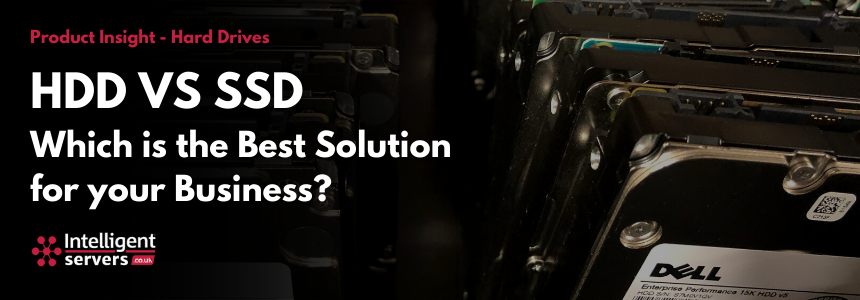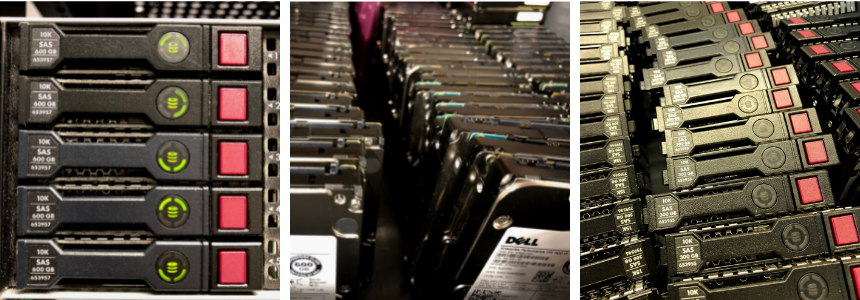
Are you running low on storage space or noticing slower speeds? It could be time for you to look at a hard drive update. When it comes to the world of hard drives, one of the big questions is whether to opt for an HDD or an SSD.
Enterprise Hard Drives are designed to provide speed and reliability for a range of demanding applications. Both HDDs and SSDs will store your data, but they differ in how they store and access it. Which option is best for you will come down to your technical and budget requirements. In this post, we take a look at what each has to offer and the differences.

HDDs
Introduced by IBM in 1956, Hard Disk Drives (HDDs) have been relied on as a cost-effective means of storing data for decades.
Hard Disk Drives hold your data and unlike random access memory (RAM), it isn’t lost when powered down, it’s non-volatile. It relies on spinning disks or platters to read and write data, spinning from 7.2K to 15K rpm. The higher the speed, the quicker it reads and writes your data.
HDDs are most suited to ‘cold’ data; they are ideal for keeping your data stored and accessible when you don’t need it to read and write the data multiple times a day. If your requirements lend to this, and you need masses of storage capacity that’s budget-friendly, a HDD could be for you.
Whilst they are known for being less energy-efficient and can’t compete with the speed of an SSD, they’re a reliable and cost-effective option for many workloads, with an abundance of capacity.
Advantages: Storage Capacity and Affordability
Disadvantages: Slower Speeds, Use More Power
SSDs
A Solid State Drive (SSD) also holds your data but has no moving parts. It functions on flash memory which stores the data even when there’s no power flowing through them, whereas an HDD writes to a physical disk. As one of its defining characteristics, this means the SSD can load information at winning speed. Put simply, an SSD will do the same as an HDD but much quicker.
An SSD is an ideal option if you need your hard drive to cope with high performance processing at top speeds. Moreover, with no moving parts it is reliable in harsh environment conditions whilst running more efficiently and cooler. However, the benefits of its speed, flexibility and durability come with a price tag. Opting for an SSD would be a pricier option than the capacity you could get with an HDD. But if you need a drive that will be used for read-intensive workloads and have the budget, an SSD could be for you.
Advantages: Speed, Efficiency and Durability
Disadvantages: Pricier option
Which is right for you?
Which is the best solution for you comes down to your requirements and budget. Both SSDs and HDDs have their purpose and place in the world of hard drives. The right option for you depends on what you require from your hard drive; are you going to be reading and writing large files? Or do you need hundreds of gigabits or even terabytes of storage space?
If you’re looking for an affordable solution with large storage capacity, an HDD is a great option. If you’re needing speed, performance and have the budget, an SSD might be the right fit for you. It’s also worth remembering that whichever you chose, upgrading is always an option as your technical requirements grow and evolve down the line.
You can browse our range of professionally refurbished Enterprise HDDs and SSDs here, or if you have any questions get in touch with our friendly team.
Call: 01423 223430 Email: sales@intelligentservers.uk Live chat: Mon-Fri 9am-5.30pm
Intelligent Servers is a leading refurbished server, storage, networking and components reseller. We specialise in HP, Dell and Cisco, supplying thousands of businesses across Europe.



